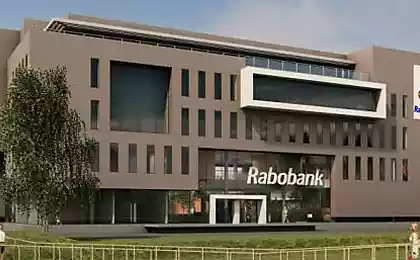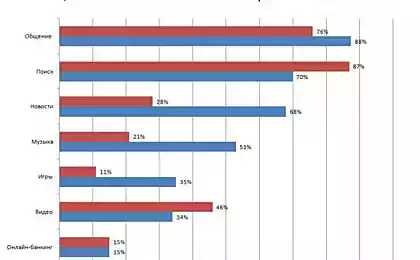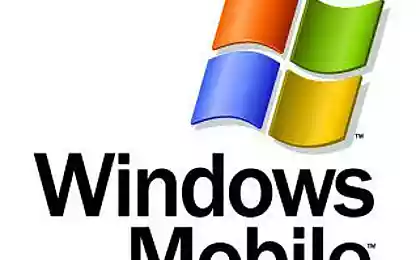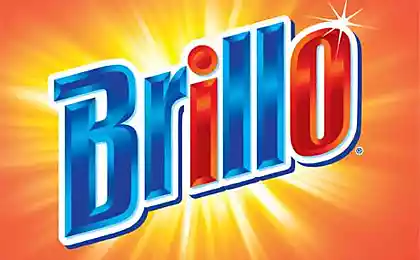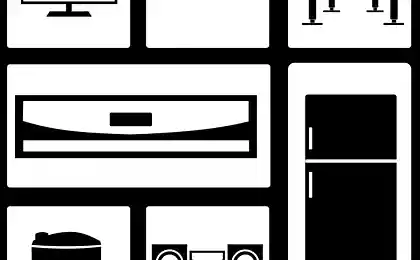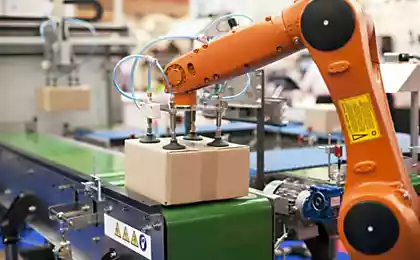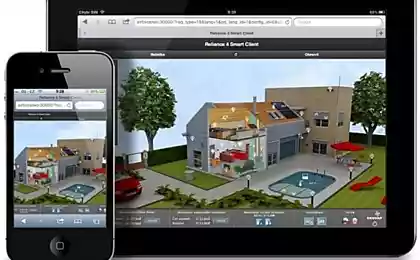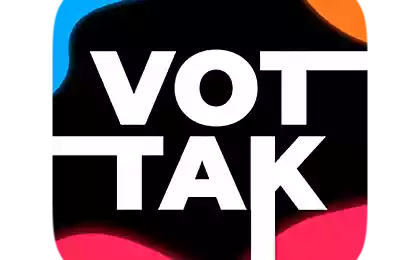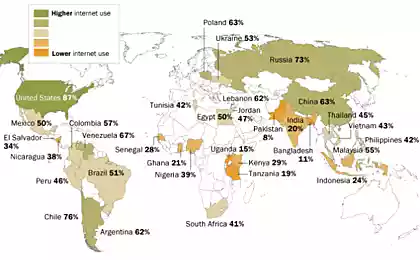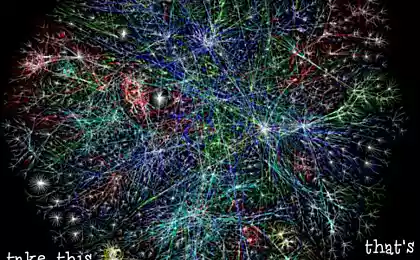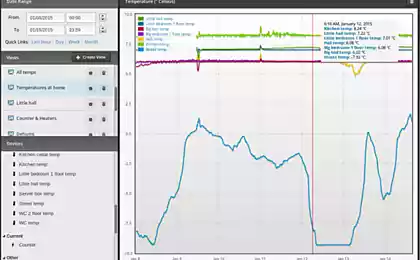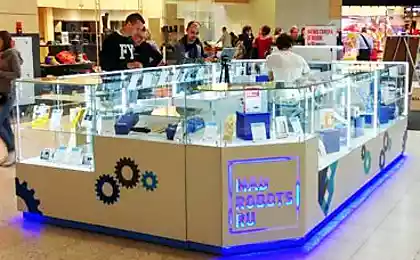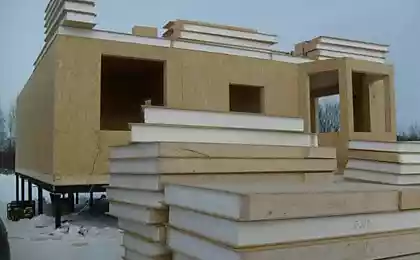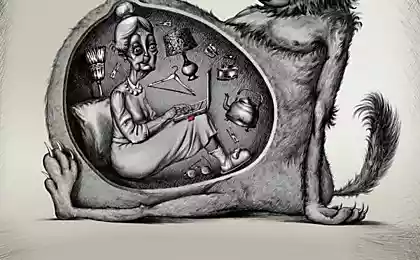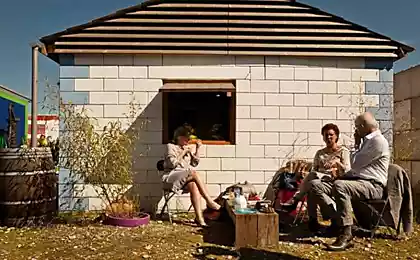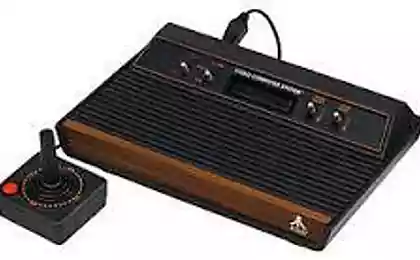1037
The impact of Internet of Things in the market of professional installations
As an IT company, we can not fail to notice the changes in the global IT market in general and automation market in particular. Предыдущий Poll , we carried out showed that professional systems integrators "smart house" or have been using the device of the "Internet of Things", or plan to do so. Therefore, we turned to our loyal customers - professional installers with questions on the topic: «How IoT will affect the growth of the market of professional installation of" smart house? » B> In addition, we began to wonder if this is a global trend, or have some geographic boundaries? Therefore, we conducted a survey in English and Russian languages. That's what we've got.
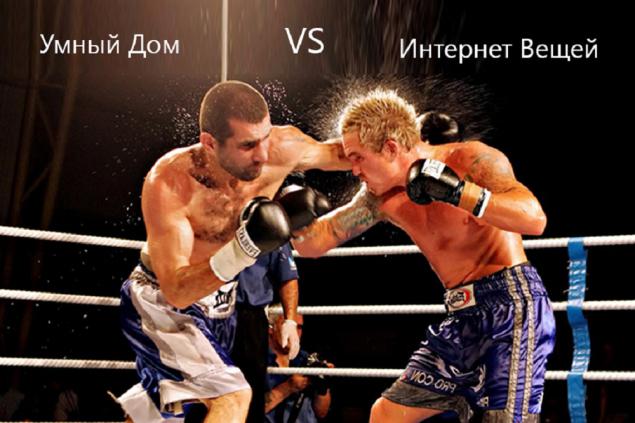
Question 1: How will the expansion of the Internet of things on the market of professional installation? B>
Answers Russian-speaking participants
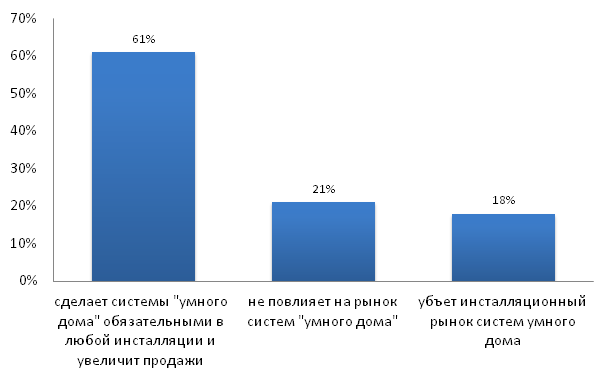
Answers Anglophone participants
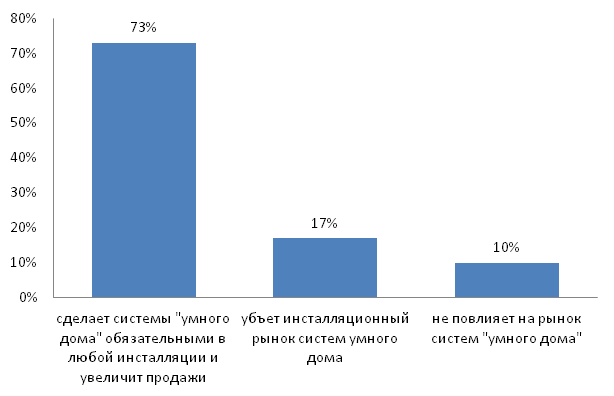
From the graph clearly shows that the Russian-speaking and English-speaking integrators, agree on the successful integration and mutually beneficial coexistence of two modern IT concepts. At the same time, foreign experts are more optimistic in their assessment compared with the Russian integrators: 73% and 61% of responses, respectively. It completely, can be explained by the fact that the Western world, a little longer familiar with the idea of smart homes, and with the concept of the Internet of things, that is, experts see their development in a long-term retrospective, which allows them to make more optimistic forecasts for the future. Foreign experts see no threat to the IoT market yourself and your business.
Question 2: What happens if the Wi-Fi (Z-Wave / Zigbee / Bluetooth) light bulb will appear in all stores for more than a reasonable price? How will this affect the sale of the installation of lighting control devices (KNX, Lutron, HDL, and others.)? B>
Answers Russian-speaking participants
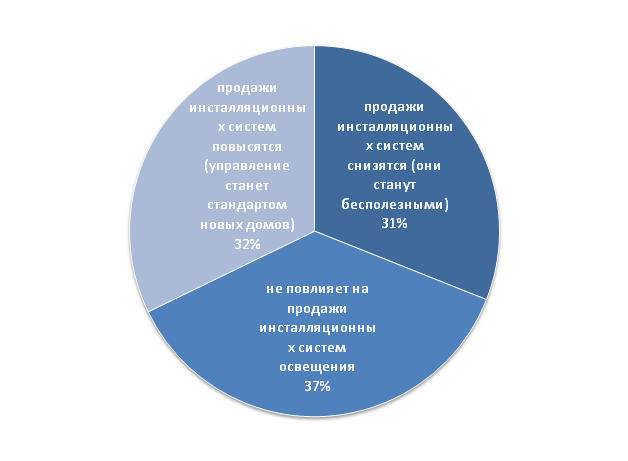
Answers Anglophone participants
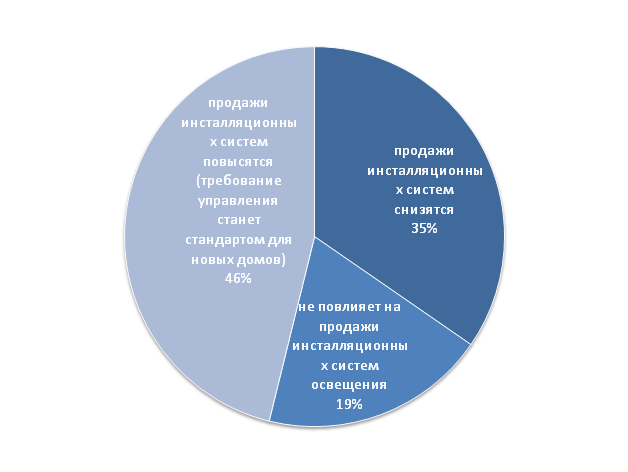
By comparing the answers to the second question, we got quite an interesting picture. Answers in Russian (31%, 32% and 37% for each variant) show some caution Russian professionals in assessing the impact of the Internet of things on the market of home automation. They are not sure whether this new evolving concept to reach the level of the mainstream. Foreign experts, on the other hand, again making more optimistic forecasts. Almost half of respondents (46%) believe that the development of the concept of the Internet of things will have a positive effect on the market of professional installations, as do home automation market more widespread.
Question 3: What do you advise the customer to climate systems at the facility? B>
Answers Russian-speaking participants
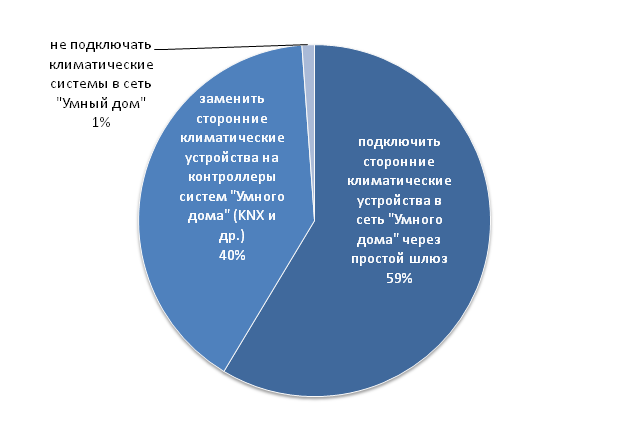
Answers Anglophone participants
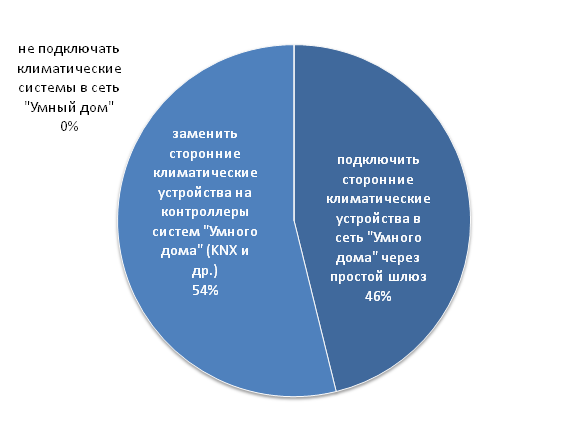
Both Russian and foreign experts in most cases agree that climate system should be connected to the network smart home. However, opinions differ considerably as to which devices need to be connected. Russian experts prefer to use a third-party devices and integrate them into projects through the gateway. Foreign engineers in more than half of the cases prefer controllers Home Automation systems, not the device. This may be due to system integrators training abroad. Specialists are trained to work with a certain type of equipment, therefore, it is the equipment they will use in their projects. In Russia, the situation is different. There is no established system of training, as a result of integrators try to work with different types of equipment, such as belonging to a system of Smart homes or not. Therefore, the integration of different types of equipment for a project is considered as an acceptable option.
Question 4: What do you advise the customer more for music systems at the facility? B>
Answers Russian-speaking participants
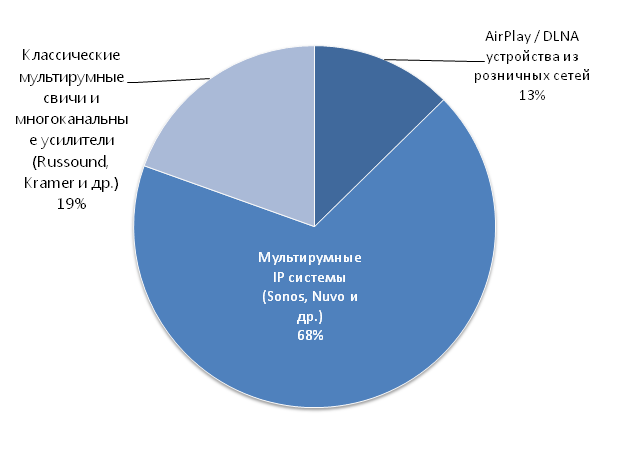
Answers Anglophone participants
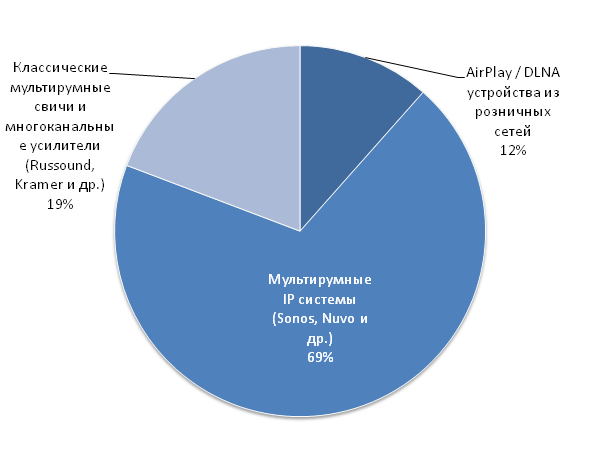
Surprising unanimity showed all the respondents in response to a question about the recommended multiroom systems. Most professionals prefer Multiroom IP systems such as Sonos, Nuvo, etc., which is understandable. Systems based on TCP / IP are flexible, scalable, easy operation and reasonable cost of the final decisions.
Question 5: What do you recommend to the customer to remotely alert the client about any event in the house? B>
Answers Russian-speaking participants
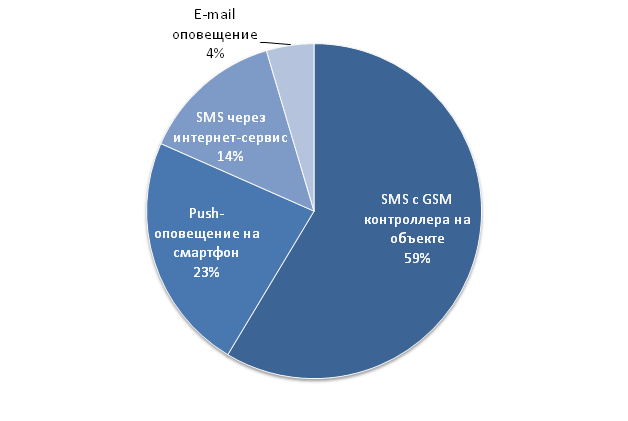
Answers Anglophone participants
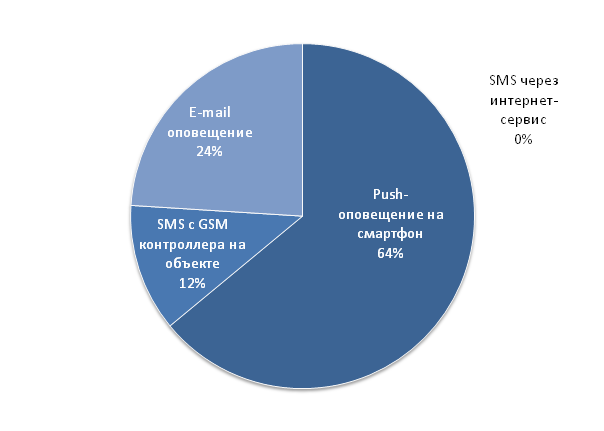
As can be seen from the diagrams, preferences in choosing how to be notified about events in smart home are significantly different from the representatives of different countries. English speaking respondents in most cases (64%) selected push-notification Russian speakers most (59%) prefer a GSM SMS controller object. Most likely, this is due to the fact that the mobile Internet (necessary for push-notifications) in Europe and the United States has a much larger scope and quality of the coating in comparison with Russia. For this reason, quite popular e-mail alert. In Russia, all these ways to communicate at the moment are more reliable SMS with GSM controller installed in the facility, and this explained his high popularity.
To summarize i>, experts in the field of automation, both English-speaking and Russian-speaking, do not see the concept of Internet of things any threat market professional installations. At the same time, foreign experts are more optimistic about the outlook for the interaction of these two modern trends.
Comments survey participants:
To the Internet of Things is playing an important role ... Prof. automation system must have the autoconfiguration tools. While such systems are not, all this will be just a toy ...
Vadim rats EVIKA representative in the Urals Federal District i>
The faster in our country will be established production systems "smart house", the more likely these systems will cease to be systems for the rich, and are expected to become public ...
Vadim Balashov, "Vector» i>
The main change for professional integrators lies in the fact that you need to become adaptive. Someone wants to use the AppleTV and Account AppStore, someone wants the old rack in the basement with a bunch of movies and music. And the specialist must find quality solutions for different queries. Integrator who wants to survive in the world of IoT, will need to offer what the client does not buy in the store (integration with bracelets, TV, custom design, etc.)
Anton Titov i>
Not enough of a unique software solution for all new appliances and devices, as there is no single protocol to communicate all new "gadgets". This aspect makes it difficult to put into operation and the current system of "smart homes". Different bulbs, weather and climate stations.
Alex Ryabushkin, Domus Sapiens i>
Growth of the Internet of Things will increase interest in smart homes and possibly kill a part of the professional market. To start people need to understand that the devices from the Internet of things - it's just gadgets. Professional installation - is quite another. Those who are now paying for the smart home, will continue to pay for professional installation. Some customers, fans of various gadgets (Bose, Apple, etc.), probably (85%) will choose the device from the Internet of things instead of professional solutions.
Bogdan Dragoi, iRidium mobile distributor in Romania i>
I think the opposition "kill vs will develop 'too dramatic. I hope that the Internet of Things and professional smart homes will grow in parallel, each within its market.
Derek R. Flickinger, Interactive Homes, Inc. I>
It depends on how many technologies embedded in each device. For example, a waste of time to manage each bulb individually if you can program the control groups, and easily create scripts, so the old equipment would be useless.
Richard Ryan, Platinum Integration i>
We got some interesting results. We will also be glad to know your opinion on this issue.
Source: geektimes.ru/company/iridiummobile/blog/249000/

Question 1: How will the expansion of the Internet of things on the market of professional installation? B>
Answers Russian-speaking participants

Answers Anglophone participants

From the graph clearly shows that the Russian-speaking and English-speaking integrators, agree on the successful integration and mutually beneficial coexistence of two modern IT concepts. At the same time, foreign experts are more optimistic in their assessment compared with the Russian integrators: 73% and 61% of responses, respectively. It completely, can be explained by the fact that the Western world, a little longer familiar with the idea of smart homes, and with the concept of the Internet of things, that is, experts see their development in a long-term retrospective, which allows them to make more optimistic forecasts for the future. Foreign experts see no threat to the IoT market yourself and your business.
Question 2: What happens if the Wi-Fi (Z-Wave / Zigbee / Bluetooth) light bulb will appear in all stores for more than a reasonable price? How will this affect the sale of the installation of lighting control devices (KNX, Lutron, HDL, and others.)? B>
Answers Russian-speaking participants

Answers Anglophone participants

By comparing the answers to the second question, we got quite an interesting picture. Answers in Russian (31%, 32% and 37% for each variant) show some caution Russian professionals in assessing the impact of the Internet of things on the market of home automation. They are not sure whether this new evolving concept to reach the level of the mainstream. Foreign experts, on the other hand, again making more optimistic forecasts. Almost half of respondents (46%) believe that the development of the concept of the Internet of things will have a positive effect on the market of professional installations, as do home automation market more widespread.
Question 3: What do you advise the customer to climate systems at the facility? B>
Answers Russian-speaking participants

Answers Anglophone participants

Both Russian and foreign experts in most cases agree that climate system should be connected to the network smart home. However, opinions differ considerably as to which devices need to be connected. Russian experts prefer to use a third-party devices and integrate them into projects through the gateway. Foreign engineers in more than half of the cases prefer controllers Home Automation systems, not the device. This may be due to system integrators training abroad. Specialists are trained to work with a certain type of equipment, therefore, it is the equipment they will use in their projects. In Russia, the situation is different. There is no established system of training, as a result of integrators try to work with different types of equipment, such as belonging to a system of Smart homes or not. Therefore, the integration of different types of equipment for a project is considered as an acceptable option.
Question 4: What do you advise the customer more for music systems at the facility? B>
Answers Russian-speaking participants

Answers Anglophone participants

Surprising unanimity showed all the respondents in response to a question about the recommended multiroom systems. Most professionals prefer Multiroom IP systems such as Sonos, Nuvo, etc., which is understandable. Systems based on TCP / IP are flexible, scalable, easy operation and reasonable cost of the final decisions.
Question 5: What do you recommend to the customer to remotely alert the client about any event in the house? B>
Answers Russian-speaking participants

Answers Anglophone participants

As can be seen from the diagrams, preferences in choosing how to be notified about events in smart home are significantly different from the representatives of different countries. English speaking respondents in most cases (64%) selected push-notification Russian speakers most (59%) prefer a GSM SMS controller object. Most likely, this is due to the fact that the mobile Internet (necessary for push-notifications) in Europe and the United States has a much larger scope and quality of the coating in comparison with Russia. For this reason, quite popular e-mail alert. In Russia, all these ways to communicate at the moment are more reliable SMS with GSM controller installed in the facility, and this explained his high popularity.
To summarize i>, experts in the field of automation, both English-speaking and Russian-speaking, do not see the concept of Internet of things any threat market professional installations. At the same time, foreign experts are more optimistic about the outlook for the interaction of these two modern trends.
Comments survey participants:
To the Internet of Things is playing an important role ... Prof. automation system must have the autoconfiguration tools. While such systems are not, all this will be just a toy ...
Vadim rats EVIKA representative in the Urals Federal District i>
The faster in our country will be established production systems "smart house", the more likely these systems will cease to be systems for the rich, and are expected to become public ...
Vadim Balashov, "Vector» i>
The main change for professional integrators lies in the fact that you need to become adaptive. Someone wants to use the AppleTV and Account AppStore, someone wants the old rack in the basement with a bunch of movies and music. And the specialist must find quality solutions for different queries. Integrator who wants to survive in the world of IoT, will need to offer what the client does not buy in the store (integration with bracelets, TV, custom design, etc.)
Anton Titov i>
Not enough of a unique software solution for all new appliances and devices, as there is no single protocol to communicate all new "gadgets". This aspect makes it difficult to put into operation and the current system of "smart homes". Different bulbs, weather and climate stations.
Alex Ryabushkin, Domus Sapiens i>
Growth of the Internet of Things will increase interest in smart homes and possibly kill a part of the professional market. To start people need to understand that the devices from the Internet of things - it's just gadgets. Professional installation - is quite another. Those who are now paying for the smart home, will continue to pay for professional installation. Some customers, fans of various gadgets (Bose, Apple, etc.), probably (85%) will choose the device from the Internet of things instead of professional solutions.
Bogdan Dragoi, iRidium mobile distributor in Romania i>
I think the opposition "kill vs will develop 'too dramatic. I hope that the Internet of Things and professional smart homes will grow in parallel, each within its market.
Derek R. Flickinger, Interactive Homes, Inc. I>
It depends on how many technologies embedded in each device. For example, a waste of time to manage each bulb individually if you can program the control groups, and easily create scripts, so the old equipment would be useless.
Richard Ryan, Platinum Integration i>
We got some interesting results. We will also be glad to know your opinion on this issue.
Source: geektimes.ru/company/iridiummobile/blog/249000/
